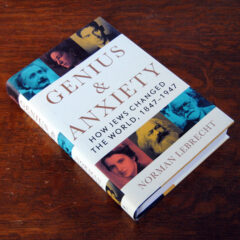
“In a political climate where anti-Semitism is resurgent and revisionism goes unchallenged, this history is a counterpoint to the fake news and false assumptions. From the humble hamburger to the space rocket, everything has a Jewish reason.”
The last paragraph on the inside dust jacket for Genius & Anxiety by Norman Lebrecht is not only the reason for its being, it is also a reason to open its pages.
The book focuses on a chronology of people and ideas for a particular century from 1847 to 1947, where “a handful of men and women changed the way we see the world.” From those you know like Marx, Freud, Proust, Einstein, and Kafka to those you may not like Ehrlich, Marcus, Franklin, Haber.
And the thing that binds them all together is that “among Jews, anxiety is a primary motivating factor, the engine of fresh thinking.”
But this is not merely a Jewish book, written by Jews for Jews. No, no, no. This is a book about how anxiety as “the engine of fresh thinking” changed the world. There is a part of this book which makes the century Lebrecht selected for it intriguing; it is not just the people who are contained within that time period, it is that the circumstances were almost always stacked against these particular people. Their Jewish identity was often part of that circumstance, but not always.
One of the things that strikes me in this work is that the thread of Judaism is but one thread. There are others – some in belief, some in the arts or sciences, some familial and some circumstantial – but the interconnectedness of this book is not to be ignored or understated.
It is to be celebrated. It isn’t just religion or the aforementioned threads that make this work soar; it’s the author’s connection. In a sense, that connection exists for us all, but we don’t all have the generations or their stories available to us. In light of that personal absence, we have books like this.

We always, almost exclusively, talk of science and breakthroughs on the impact they have on our world, but this book makes sure to turn that perspective around and look at the impact that those breakthroughs – scientific, artistic, or political – had on the people who were there.
This is a fascinating look at the world as it was. Remember that this was a time that contained two world wars, multiple scientific breakthrough, and the creation of media as we now know it. It also chronicles many of the faces and names that brought those things to the forefront, even if perhaps we thought it was someone else’s work.
Genius & Anxiety works to set the record straight and, in many cases, educate people beyond the plasticine multiple choice education they may have received creating generations that can be taught theories but not how to create them.
This is not a wholly Jewish book. It was not written by Jews for Jews. It was written, as most books are, for everyone. And if you enjoy history, science, music, or even television and movies, Genius & Anxiety will interest you.
If you aren’t sure how, I have one word for you: Interconnectedness.
Read the Secret File of technical information and quotes from Genius & Anxiety.